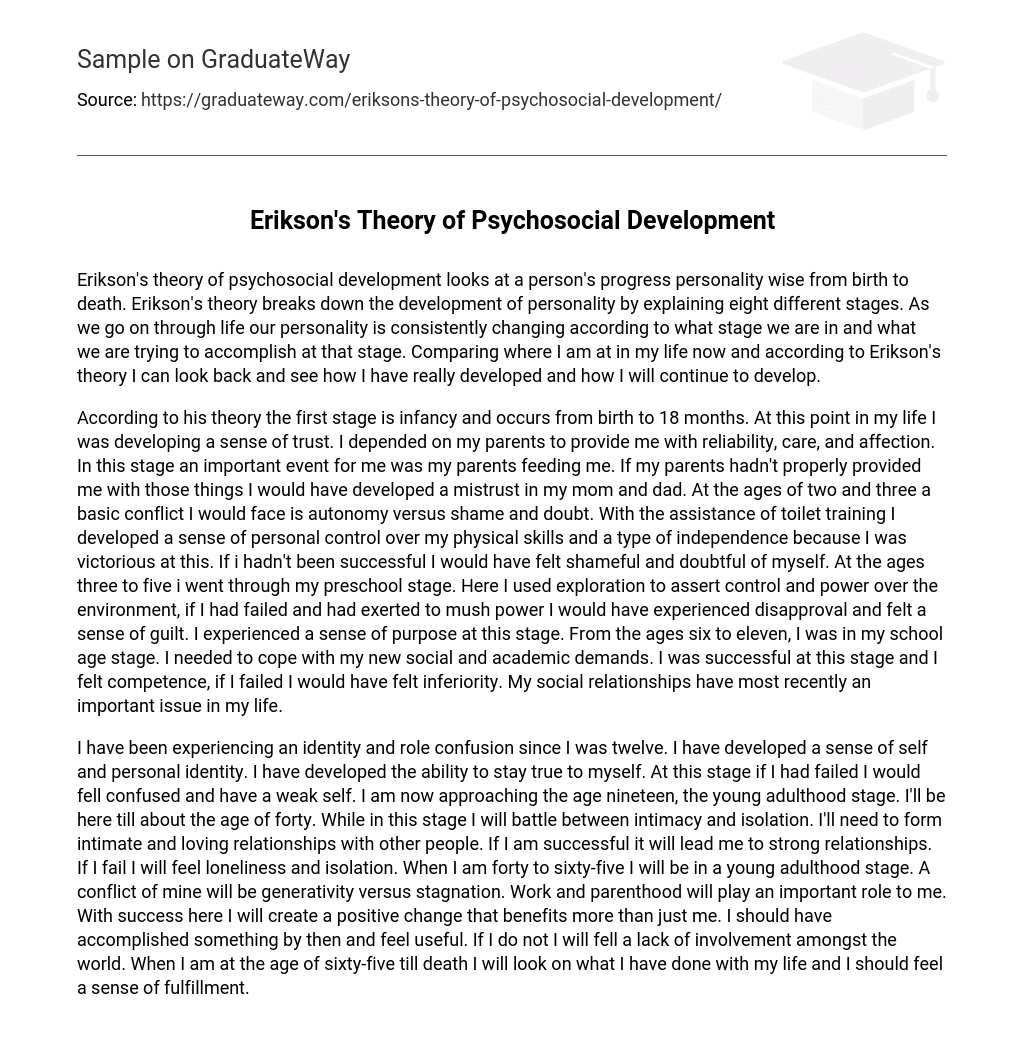Erikson’s theory of psychosocial development offers understanding of the evolution of a person’s personality over their lifetime. This theory comprises eight stages that elucidate the growth of one’s personality. As we advance in life, our personality undergoes ongoing transformations based on the stage we are presently in and the objectives we strive to accomplish during that stage. By contemplating my current position in life and considering Erikson’s theory, I can perceive substantial personal growth I have already encountered and anticipate further progression in the future.
According to the theory, the initial stage is infancy, which spans from birth to 18 months. During this period, I developed trust and relied on my parents for care, reliability, and affection. The act of being fed by my parents played a crucial role in establishing whether I would develop trust or mistrust towards them. Between the ages of two and three, I faced the conflict of autonomy versus shame and doubt. Successful toilet training allowed me to gain control over my physical abilities and foster independence. Failing in this area would have caused feelings of shame and self-doubt. From ages three to five, I experienced the preschool stage where exploration was used as a means to exert control and power over my surroundings. Exerting excessive power would have resulted in disapproval and guilt. This phase provided a sense of purpose. As I entered the school age stage between six and eleven years old, I had to deal with new social and academic challenges. Achieving success during this period led to feelings of competence, while failure generated feelings of inferiority. Most recently, my social relationships have become a significant aspect of my life.
From the age of twelve, I have grappled with confusion about my identity and role. However, over time, I have developed a strong sense of self and the ability to stay true to myself. Approaching nineteen years old, I am now in young adulthood which lasts until approximately forty years old. During this stage, I will face the challenge of balancing intimacy and isolation in relationships. Nurturing deep connections will lead to fulfilling relationships while failing may result in loneliness. From forty to sixty-five years old, still in young adulthood, there will be a conflict between generativity and stagnation as work and parenthood play important roles. Success here allows for positive changes benefiting more than just oneself. By then, meaningful accomplishments should bring a sense of usefulness; failure may lead to lack of involvement with the world. Moving into the phase from sixty-five onwards until death, reflection on life’s achievements is expected along with profound fulfillment or despair when grappling with ego integrity conflict.
Reflecting on my life’s journey should bring me contentment with my accomplishments so far. This final phase of personal growth typically brings a sense of wisdom and extreme satisfaction. Failing in this stage, however, would result in regret, bitterness, and despair.
Throughout my personal development journey, I have consistently aimed for a better comprehension of myself. Thus far, I have achieved success in the stages I have already undergone and will continue progressing towards self-identity. Each accomplished stage brings me closer to fulfilling what is required in the subsequent stage. Any failure during this journey will impact my ability to proceed through future stages. All phases of personal development collaborate harmoniously to ultimately reach the final stage. According to Erikson, every stage presents individuals with a struggle that acts as a pivotal moment in their growth. These struggles are centered around either developing or failing to develop a psychological attribute. During these periods, there is an increased potential for personal growth but also a heightened risk of failure.
Reference
The text “Macionis, John J. (2011) Society: The Basics, 11th edition. Upper Saddle River, NJ: Prentice-Hall.” was written by Macionis and is the 11th edition of the book “Society: The Basics”. It was published in Upper Saddle River, NJ by Prentice-Hall.





